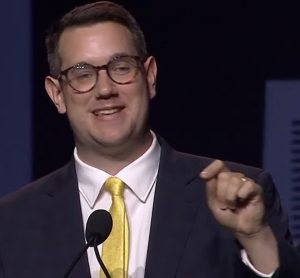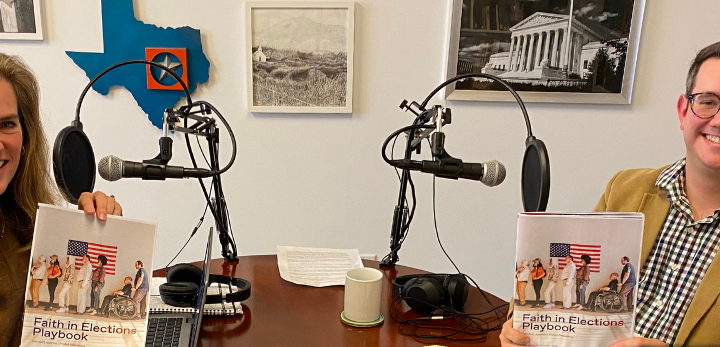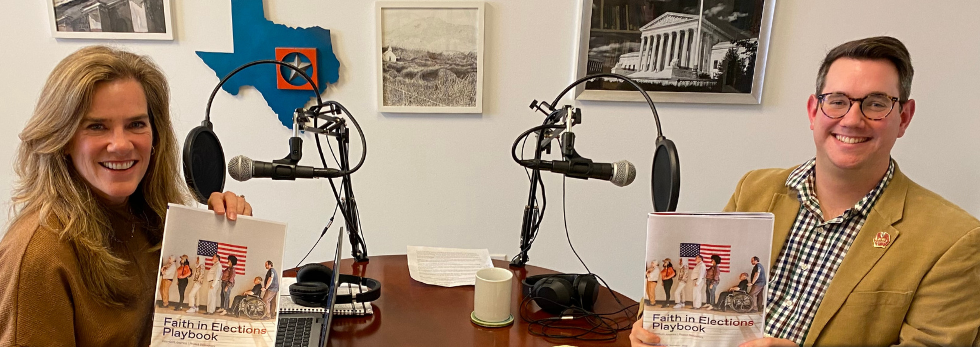It will take a broad coalition of Americans willing to set aside political and cultural differences to defeat the growing authoritarian movement bent on undermining constitutional freedoms, pro-democracy activist Chris Crawford said on the Baptist Joint Committee for Religious Liberty’s “Respecting Religion” podcast.
“Faith communities are such a vital part of building that coalition,” said Crawford, a policy strategist with Protect Democracy, a Washington, D.C.-based nonprofit committed to defeating totalitarianism and supporting resilient democratic institutions. He was interviewed by BJC General Counsel Holly Hollman for the Feb. 1 episode.
Project Democracy has partnered with Interfaith America, which promotes religious diversity for social good, to harness the influence of faith-based groups for the protection of political and religious freedoms, Crawford said.
The campaign “is particularly concerned with helping houses of worship, religious nonprofits and entire denominations think about how they can take action in nonpartisan ways that are aligned with their values, their skillsets and the specific needs of their communities to help ensure we have a free and fair election,” he said.

Chris Crawford
Hollman asked Crawford to describe the severity of the threat American democracy faces in the current election cycle. Republican Donald Trump is famous for promoting the Big Lie behind his 2020 presidential loss and has used consistently ant-democratic rhetoric in his campaigns.
“I used to be someone who thought our institutions would just naturally hold, and that there was a lot of inevitability to the United States functioning effectively, our democracy working,” Crawford said. “I don’t feel that way anymore. There’s so much evidence of people pushing against our institutions that I think we really cannot be complacent at this moment.”
Among the most dangerous authoritarian claims is that a president can or should be above the law. That concept threatened the free elections and peaceful transfer of power after the 2020 election, Crawford said.
“It’s important for us to remember that there’s not something divine about our Constitution or our institutions. They’re run by people. The checks and balances we have are meaningless if we don’t have people who utilize them and if we don’t have people standing up to authoritarianism.”
Promoters of authoritarianism operate by demeaning democracy and government institutions and by promising quick fixes to complicated political and social challenges, he added. “Authoritarians can be very good at casting a vision that ‘if you stick with me, you’ll get what you want. I alone can fix it.’”
One of the missions of the coalition being assembled is to build dialogue with Americans who harbor totalitarian beliefs and to explain what would be lost if their visions were realized.
“It’s important to start with recognizing that we do have differences. When we try to paper over the differences we have, it actually can decrease trust,” Crawford said. “But it’s important to understand that everything is threatened if we lose our democracy and our institutions, no matter what issue you care most about. It’s important to think about the fact that it doesn’t mean the issues go away or that the differences go away. It means we preserve a system to resolve those differences peacefully.”
To help communities of faith begin that process, Project Democracy has created an elections playbook that begins by changing the narrative about the divisions between Americans.
“Authoritarianism thrives on despair, hopelessness, anger and resentment. Democracy depends on hope and possibility.”
“Only by separating democracy vs. authoritarianism from left vs. right, from progressive vs. conservative, can we learn to police the boundaries of healthy democracy in our own politics, communities, and conversations,” the playbook states.
The guide also encourages congregations to support local democracy by volunteering to staff election sites, hosting voting sites and inviting elections officials to speak at church and community functions. It also pushes pro-democracy groups to write letters to the editor and to vote for pro-democracy candidates.
The playbook also urges coalition members not to lose hope in the process: “Authoritarianism thrives on despair, hopelessness, anger and resentment. Democracy depends on hope and possibility. The most important tools we have are our optimism, willingness to trust and collaborate, openness to possibility, and strength in diversity.”
The involvement of religious groups helps counter the Christian nationalist rhetoric surging through the authoritarian movement, Crawford said. “One of the things that upset me most after the 2020 election was the lies about the election and the ways faith leaders played a part in that. And we saw this on Jan. 6, either by directly telling lies or trying to get cute and accommodate lies and give room for these lies about voter fraud.”
Hollman said the campaign’s coalition-building and truth-telling aims run parallel to the work of Christians Against Christian Nationalism, a group formed and run through BJC. “We believe religious freedom is something people want and we have to work to protect. And I hear from you that most people want democracy and we have to work to maintain it.”
Crawford said there is no way to separate free elections from freedom of religion.
“You need a functioning democracy in order to really have any other rights,” he said. “Our rights don’t exist in a vacuum, and we need to be thinking about ways we’ll stand up for each other’s right to vote and stand up for each other’s right to practice our faith.”


